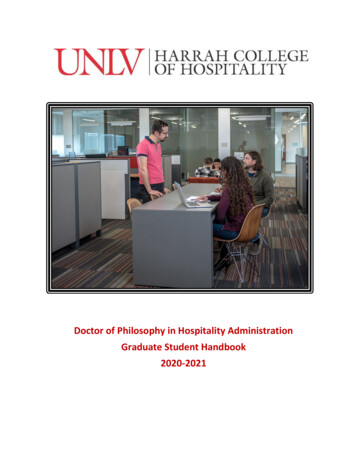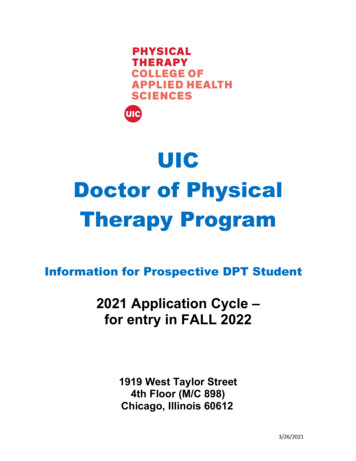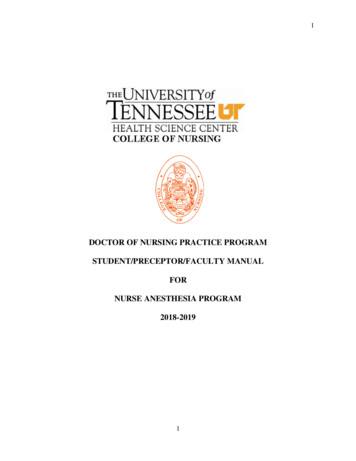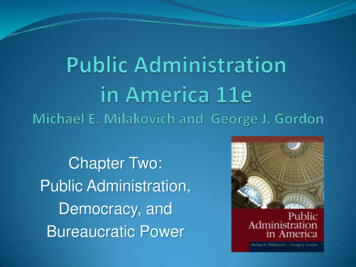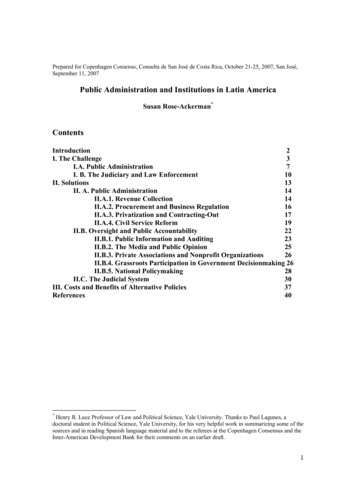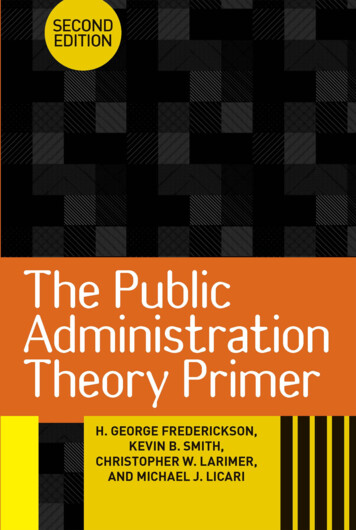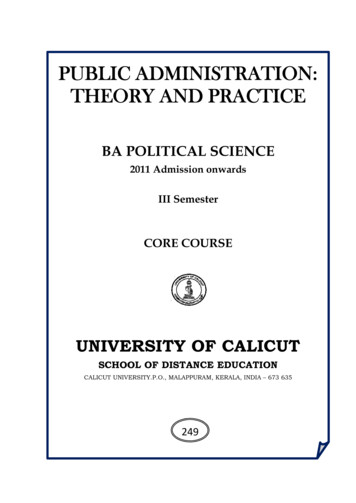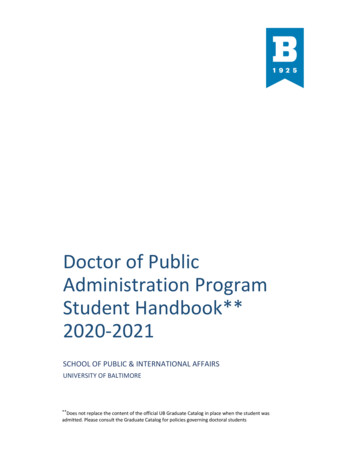
Transcription
Doctor of PublicAdministration ProgramStudent Handbook**2020-2021SCHOOL OF PUBLIC & INTERNATIONAL AFFAIRSUNIVERSITY OF BALTIMORE**Does not replace the content of the official UB Graduate Catalog in place when the student wasadmitted. Please consult the Graduate Catalog for policies governing doctoral students
Table of ContentsTHE FACULTY. 3DPA Program Director. 3Faculty Members . 3Affiliated Faculty . 4DEGREE REQUIREMENTS . 5Core Courses (21 credits) . 5Advanced Methodology (6 credits). 5Specialization Courses (9 credits) . 5Dissertation Research . 6ADVISING . 6Academic . 6Administrative. 6Continuous Enrollment . 7THE DISSERTATION . 7STEPS TO GETTING A DISSERTATION PROSPECTUS ACCEPTED . 8Choosing a Chair . 8Selecting Committee Members . 9Developing a Prospectus. 10Defending the Prospectus. 11Seeking Institutional Review Board Approval for Research . 13WHAT HAPPENS AFTER THE PROSPECTUS IS APPROVED? . 13HOW DO YOU COMPLETE THE DISSERTATION?. 13Oral Defense . 14After the Presentation . 15Document Binding . 16APPENDICES . 18Appendix A: DPA Checklist . 18APPENDIX B: REQUEST TO INCLUDE AN EXTERNAL COMMITTEE MEMBER . 19APPENDIX C: DISSERTATION PREPARATION GUIDE AND CHECKLIST FOR PROSPECTUS ANDDISSERTATION. 20APPENDIX D: IRB APPLICATION . 26APPENDIX E: APPROVAL FORM . 271 Page
APPENDIX F: SAMPLE DISSERTATION APPROVAL PAGE. 27APPENDIX G: DEFENSE OF PROPOSAL OR DISSERTATION . Error! Bookmark not defined.APPENDIX H: DISSERTATION SUBMISSION & VERIFICATION . 29ASPA'S CODE OF ETHICS . 302 Page
THE FACULTYDPA Program DirectorDr. Aaron Wachhaus, associate professor. Areas of research interest and expertise: publicadministration and governance theory; social networks and network analysis; community-building.Contact information: 410.837.6113; awachhaus@ubalt.eduFaculty MembersDr. John J. Callahan, executive in residence. Areas of research interest and expertise: public finance andbudgeting; intergovernmental relations and federalism; health care reform; biopreparedness; andleadership and crisis management.Contact information: 410.837.6174; jcallahan@ubalt.edu.Dr. Thomas A. Darling, associate professor. Areas of research interest and expertise: strategic planning;dispute resolution; application of information technology to individual and group decision-making in thepublic sector.Contact information: 410.837.6195; tdarling@ubalt.edu.Dr. Ed Gibson, associate professor. Areas of research interest and expertise: performance management;public finance with emphasis on equity investment in municipalities; and ideational influence onpolicymaking.Contact information: 410.837.6117; egibson@ubalt.edu.Dr. Ferzana Havewala, assistant professor. Areas of research interest and expertise: program & policyevaluation; quantitative research methods; social inequality; segregation; food insecurity.Contact Information: 410.837.5326; fhavewale@ubalt.edu.Dr. Lenneal J. Henderson, emeritus professor. Areas of research interest and expertise: social equity;public management; state & local government.Contact information: lhenderson@ubalt.edu.3 Page
Dr. George Julnes, professor. Areas of research interest and expertise: program evaluation studies;program evaluation theory; disability policy; and human services.Contact information: 410.837.6256; gjulnes@ubalt.edu.Dr. C. Alan Lyles, professor; Henry A. Rosenberg Professor of Public, Private and Nonprofit Partnerships.Areas of research interest and expertise: managing pharmaceutical supply: domestic and international;health insurance initiatives; prevention and treatment of obesity, substance abuse and other lifestyleconsequences.Contact information: 410.837.6101; calyles@ubalt.edu.Dr. Jiwon Nam-Speers, assistant professor.Contact information: 410.837.5539; jnam@ubalt.edu.Dr. Lorenda A. Naylor, associate professor. Areas of research interest and expertise: child welfare;privatization; and administrative reform.Contact information: 410.837.6089; lnaylor@ubalt.edu.Dr. Laura Wilson-Gentry, professor, associate Dean. Areas of research interest and expertise: programevaluation; policy studies of welfare reform and the working poor.Contact information: 410.837.6102; lwgentry@ubalt.edu.Dr. Heather Wyatt-Nichol, associate professor. Areas of research interest and expertise: diversitymanagement, ethics, family friendly-workplace policies, organizational behavior and social equity.Contact information: 410.837.6173; hwyatt-nichol@ubalt.edu.Affiliated FacultyDr. P. Ann Cotten, director, Schaefer Center for Public Policy. Areas of research interest and expertise:strategic planning; performance measurement; program evaluation; survey research; focus groupmoderation; public sector management; managerial accounting; and workforce planning.Contact information: 410.837.6188; acotten@ubalt.edu4 Page
DEGREE REQUIREMENTSDPA students are required to complete 48 credits beyond their master’s degree. The curriculum consistsof seven core courses, two methodology courses, three specialization courses and a minimum of 12hours of dissertation research. Students must have a GPA of 3.00 or above to graduate. Earning morethan 2 course grades of B- or lower will result in dismissal from the program. The program requires:Core Courses (21 credits)§PUAD 810 Foundations of Public Administration (3)§PUAD 811 Strategic Management in the Public Sector (3)§PUAD 813 Seminar in Doctoral Research (3)§PUAD 814 Policy Making and Implementation (3)§PUAD 815 Public-Sector Financial Analysis (3)§PUAD 817 Seminar in Program and Policy Evaluation (3)§PUAD 824 Doctoral Seminar in Organizational Theory (3)Advanced Methodology (6 credits)§PUAD 831: Case Study and Qualitative Methods§PUAD 832: Quantitative Methods (may be replaced with another methods course after receivingapproval from the DPA Director).Specialization Courses (9 credits)All students must complete three courses in a field of specialization such as program administration,program evaluation; health administration; or administration of justice. Students may create their ownspecialization upon receiving approval from their advisor. Students may not take more than 6 electivecredits as either online courses or independent studies. Permission of the program director is requiredfor independent studies. Requests for an independent study should include a brief description of coursegoals, schedule, and deliverables along with the instructor’s acknowledgement of these courseelements.With permission of the program director, students may transfer up to nine credits (9) of specializationcourses taken elsewhere. These courses cannot be more than seven years old and must not have been5 Page
used to fulfill the requirements of another degree. Please consult the graduate catalog for additioninformation.Dissertation Research§PUAD 899 Dissertation Research (12 credits)Before enrolling in this course students must: 1) complete all course work; 2) have a topic andworking title for their dissertation; 3) have their Dissertation Committee Chair sign off acompleted DPA Check List form (Appendix A); 4) have the form verified by the ProgramCoordinator; and 5) submit the form to the DPA Director.§PUAD 898 Continuous EnrollmentStudents who have earned 12 credits of PUAD 899 but have not completed their dissertationmust enroll in 1 credit of PUAD 898 each semester until their dissertation has been completedand successfully defended.ADVISINGAcademicThe program director serves as academic advisor for the program; in general, the academic advisor isthe best resource for academic and personal career planning. You may also consult with other facultymembers, particularly to discuss the possibility of collaboration or getting additional guidance. Further,you may consult with your peers. However, in no case should these be used as substitute for advisingfrom the academic advisor.AdministrativeThe program’s academic advisor should always be contacted first whenever you have questionsregarding administrative tasks such as filing forms with the University or the Program. This staff memberwill know the official process that needs to be followed or the people whom you need to talk to. She willalso keep a copy of any paperwork you file with the program or University for your student record.Finally, many of the questions you may have, (e.g., What courses are being offered? What are the datesfor filing graduation papers? When does the semester start?), can be answered by visiting theUniversity’s webpage: www.ubalt.edu or the DPA’s webpage: ificates/degree- 6 Page
Continuous EnrollmentAll graduate students at the University of Baltimore must complete their degrees within seven (7) yearsfrom initial enrollment in the program (this includes the dissertation).Students are expected to be continuously enrolled in classes. The University does recognize that thereare circumstances that may create the need for students to absent themselves from studies: If theyexpect to be gone longer than 180 days, then students should file for a leave of absence from theprogram—this keeps students under the catalog they came in under. However, the leave of absencedoes not stop the seven year clock. Failure to enroll continuously may require students to petition forre-admission to the program. Consult the catalog for procedures to follow.When ready to begin dissertation work, they must sign up for at least three credit hours per semester ofPUAD 899 until they exhaust the required 12 hours of PUAD 899. Thereafter, students must sign up for 1credit hour per semester of PUAD 898 until the dissertation has been completed and successfullydefended.THE DISSERTATIONThe final product required for completion of a doctoral degree is a serious scholarly undertaking. It givesstudents an opportunity to integrate the knowledge and skills that they have acquired over their courseof study; it provides a way to incorporate the theory, research methods, and practical knowledge of thediscipline into a single project. It is expected to contribute new knowledge and/or new application ofknowledge to the field of study. It is truly a self-directed process of which the individual student isultimately in charge. Unfortunately, the attrition rate at this stage is very high (some suggest that asmany as 50% of doctoral students remain All But Dissertation1 for life!). Thus, completing a dissertationis quite an accomplishment.The dissertation is not equivalent to the end product of an independent study or to a big paper writtento satisfy a course requirement. For one thing, a dissertation is not measured by its size. Also, adissertation is not completed when you decide you have done all you want to do; instead, it is finishedwhen your Dissertation Committee Chair and Committee Members agree it meets standards ofindependent doctoral research and accomplishes the research as laid out in the student’s prospectus. A1See s/7 Page
student usually takes at least one and a half years to satisfactorily complete the dissertation after it hasbeen fully conceptualized.Dissertations are graded Pass/Fail. While students are working on a dissertation, they receive a CS(continuing studies) grade each semester for those credits for which they have registered. This grade ischanged to Pass when, in the judgment of the Chair and Committee, they have satisfactorily completedall of the requirements (accepted prospectus, completed dissertation, successful oral defense,submission of final documents to ProQuest and to UB’s Library for binding).Some students may come to the program with an idea of what they want to do for their dissertationwork. Others discover their interest in a topic during course work. Regardless, they should discuss theirresearch interest and the requirements of the dissertation with the DPA Program Director early in theircareer. In this way they can be pointed in the direction of faculty members who may share their interestin the topic.The costs of doing a dissertation are borne by the student; there is no University or College financialsupport for completing this work. It is certainly possible that participation in faculty members’ researchprojects during graduate studies will provide support for the dissertation, but at this time there is nodirect subsidy for graduate research. Costs for using licensed questionnaires and survey instruments, forusing specialized software, and paper costs are the responsibility of students. The use of computer labhardware and licensed software at UB are covered by the fees paid by students. Special photography orprinting costs must also be anticipated.Costs for the assistance and mentoring provided by faculty members are covered in the tuitionpayments for dissertation courses. However, if students do not complete the dissertation within therequired number of credit hours listed in the catalog, they must pay additional tuition and fees to coverthe costs of these services.STEPS TO GETTING A DISSERTATION PROSPECTUS ACCEPTEDThere are various ways in which students approach their dissertation. This section outlines processesthat must take place for a prospectus to be approved. Some of these steps occur sequentially; othersoccur simultaneously.Choosing a ChairThe first step is to select a Dissertation Committee Chair (or find a Chair who will select them). The Chairmust be a full time University of Baltimore faculty member in the College of Public Affairs at the8 Page
Associate or Full Professor level; an exception may be made to allow a senior Assistant Professor toserve as chair with the approval of the Program Director.A faculty member is not obligated to take on the responsibility of directing dissertations. Facultymembers usually direct dissertations that interest them and are related to their own research agendas.Faculty members may refer students to someone else in the department whom they believe has betterexpertise in the area a student wishes to pursue. Faculty members are limited in the number ofdissertations that they can direct at one time. So, at times a faculty member may have to say no, even ifthey are very interested in a student’s topic.2Selecting Committee MembersDissertations are not under the sole direction of one individual faculty member. Each dissertationinvolves a committee of faculty members who must give approval to the project. Besides the Chair, twoother Committee Members assist with the dissertation.For doctoral dissertations, Committee Members must possess a terminal degree and must be membersof the full-time University of Baltimore faculty. In certain cases, one Committee Member may be adoctoral level academic or professional who works outside the university. However, this exceptionrequires PRIOR written approval of the Dissertation Chair and the Program Director. As this committeemember is expected to attend the prospectus defense and the dissertation defense, it is highlyrecommended that s/he be located in the metropolitan Baltimore area.This Committee should be put in place early in the process of the dissertation, before the prospectus isready for approval. But this is not necessarily done before the study is fully outlined. Committeemembers have a right to provide input along the way in the dissertation. Nonetheless, they are not thestudent’s primary contact, the Chair is. Moreover, they probably do not expect to be involved in everylittle detail of the project in the same way as the Chair.In most cases, students will find it unproductive to give all committee members all copies of drafts of theprospectus and/or (later) the dissertation itself. While students should develop the content of theprospectus in concert with all Committee Members, they should not have all of them edit every earlydraft. It is the responsibility of the Chair to monitor the process and to involve or help students involvethe committee members appropriately.So how should you go about finding a Chair? I encourage you to read Laurie L. Hernandez’s (1996) “In Search of a DissertationCommittee: Using a Qu
Doctor of Public Administration Program Student Handbook** 2020-2021 SCHOOL OF PUBLIC & INTERNATIONAL AFFAIRS UNIVERSITY OF BALTIMORE **Does not replace the content of the official UB Graduate Catalog in place when the student was admitted.
